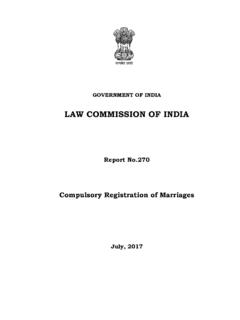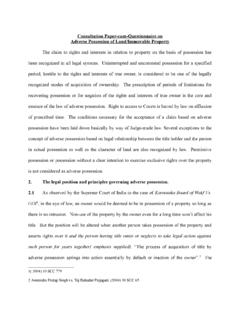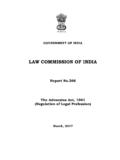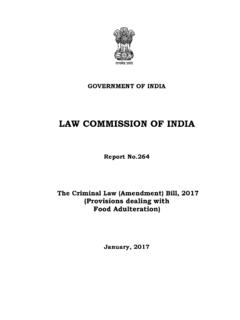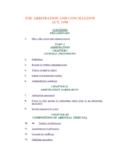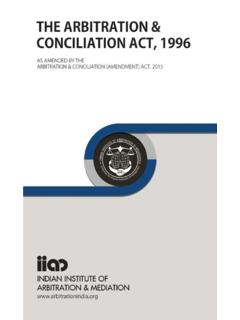Transcription of GOVERNMENT OF INDIA LAW COMMISSION OF INDIA Report …
1 GOVERNMENT OF INDIA . LAW COMMISSION . OF. INDIA . Report No. 246. Amendments to the arbitration and Conciliation Act 1996. August, 2014. The 20th Law COMMISSION was constituted for a period of three years from 1 st September, 2012 by Order No. A-45012/1 (LA) dated the 8th October, 2012 issued by the GOVERNMENT of INDIA , Ministry of Law and Justice, Department of Legal Affairs, New Delhi. The Law COMMISSION consists of a full time Chairman, four full-time Members (including Member-Secretary), two Ex-officio Members and five part-time Members. Chairman Hon'ble Justice Shah Full-time Members Justice Mr. Kapoor Prof. (Dr.) Mool Chand Sharma Justice Ms. Usha Mehra Mr. Meena, Member-Secretary Ex-officio Member Mr. Malhotra, Secretary (Department of Legal Affairs and Legislative Department). Part-time Members Mr. R. Venkataramani Prof. (Dr.) Yogesh Tyagi Dr.
2 Bijai Narain Mani Prof.(Dr.) Gurjeet Singh ii The Law COMMISSION is located in 14th Floor, Hindustan Times House, Marg, New Delhi-110 001. Member Secretary Mr. Meena Research Staff Dr. (Smt.) Pawan Sharma : Joint Secretary & Law Officer Shri Upadhyay : Additional Law Officer Shri Mishra : Deputy Law Officer Dr. Singh : Deputy Legal Adviser The text of this Report is available on the Internet at : GOVERNMENT of INDIA Law COMMISSION of INDIA iii (3)238/2012-LC(LS) 5 August 2014. Dear Mr. Ravi Shankar Prasad ji, I am enclosing herewith the 246th Report of the COMMISSION on Amendment to the arbitration and Conciliation Act, 1996'. The COMMISSION was entrusted with the task of reviewing the provisions of the arbitration and Conciliation Act, 1996 ( the Act') in view of the several inadequacies observed in the functioning of the Act. The COMMISSION had earlier recommended various amendments to the Act under its 176th Report on the arbitration and Conciliation (Amendment) Bill, 2001'.
3 After considering the recommendations of the 176th Report , the GOVERNMENT decided to accept almost all such recommendations and accordingly, introduced the arbitration and Conciliation (Amendment). Bill, 2003' in the Rajya Sabha on 22nd December, 2003. Subsequently, in the wake of the Report of the Justice Saraf Committee the Bill was referred to the Department Related Standing Committee on Personnel, Public Grievances, Law and Justice for a further analysis. The Departmental Related Standing Committee was eventually of the view that many provisions in the Bill were insufficient and contentious and, therefore, the Bill in its present form should be withdrawn and be reintroduced after considering its recommendations. Accordingly, the Bill was withdrawn from the Rajya Sabha. In order to re-look into the provisions of the Act, the Ministry of Law and Justice issued a consultation paper on 08th April, 2010 inviting suggestions from eminent lawyers, judges, industry members, institutions and various other stakeholders.
4 After receiving various responses to the Paper, the Ministry held several National Conferences across the country during July/August, 2010 inviting suggestions from lawyers, judges, industry, arbitration institutions and public at large. On the basis of such iv comments and suggestions received at the National Conferences, the Ministry prepared draft proposals and a Draft Note was prepared for the Cabinet. Thereafter, the Ministry asked the COMMISSION to undertake a study of the amendments proposed to the Act in the Draft Note for the Cabinet'. Accordingly, the COMMISSION set up an expert Committee comprising of several eminent persons from the field of law to study the proposed amendments and make suggestions accordingly. Written responses were also received from various institutions like FICCI, CII and ASSOCHAM. After extensive deliberations and study, the COMMISSION has now prepared the present Report .
5 Chapter III of the present Report contains the proposed amendments. Also Annexure to the Report contains the proposed amendments in track changes made in the present Act along with notes. With warm regards, Yours sincerely, [Ajit Prakash Shah]. Mr. Ravi Shankar Prasad Hon'ble Minister for Law and Justice GOVERNMENT of INDIA Shastri Bhawan New Delhi - 110115. v Amendments to the arbitration and Conciliation Act, 1996. Table of Contents Ch. No. Title Pages I Background to the Report 1. History of arbitration Law in INDIA 1. Scheme of the arbitration and Conciliation Act, 1996 3. 176th Report of the Law COMMISSION 4. Justice Saraf Committee 5. Report of the Department Related Standing Committee on 5. Personnel Public Grievances and Law & Justice The Present Report by the 20th Law COMMISSION 6. II Introduction to the Proposed Amendments 8.
6 Institutional arbitration in INDIA 9. Fees of Arbitrators 10. Conduct of Arbitral Proceedings 12. Judiciary and arbitration 13. Delays in Courts, Before the Tribunal and Investment Treaty 15. Risk Scope and Nature of Pre-Arbitral Judicial Intervention 18. Setting Aside of Domestic Awards and Recognition / 21. Enforcement of Foreign Awards Judicial Interventions in Foreign seated arbitrations 23. Automatic Stay of Enforcement of the Award upon Admission 25. of Challenge Powers of Tribunal to Order Interim Measures 26. Arbitrability of Fraud and Complicated Issues of Fact 27. Neutrality of Arbitrators 30. Definition of Party 31. Interest on Sums Awarded 33. Costs 34. Other Amendments 35. Transitory Provision 36. III Proposed Amendments to the arbitration and 37. Conciliation Act, 1996. Amendment to the Preamble 37. Amendment to Section 2 37.
7 Insertion of Section 6A 40. Amendment to Section 7 42. vi Amendment to Section 8 42. Amendment to Section 9 44. Amendment to Section 11 45. Amendment to Section 12 48. Amendment to Section 14 49. Amendment to Section 16 50. Amendment to Section 17 50. Amendment to Section 20 52. Amendment to Section 23 52. Amendment to Section 24 52. Amendment to Section 25 53. Amendment to Section 28 53. Amendment to Section 31 53. Amendment to Section 34 54. Amendment to Section 36 56. Amendment to Section 37 56. Amendment to Section 47 57. Amendment to Section 48 57. Insertion of Section 85A 58. Amendment to Schedules 59. Annexure: The arbitration and Conciliation Act, 1996 i - xlv showing the proposed amendments in track changes along with notes. vii Chapter I. BACKGROUND TO THE Report . 1. The arbitration and Conciliation Act, 1996 (hereinafter the 1996 Act ), is an Act to consolidate and amend the law relating to domestic arbitration , international commercial arbitration and enforcement of foreign arbitral awards, and to define the law relating to conciliation and for matters connected therewith or incidental thereto.
8 HISTORY OF arbitration LAW IN INDIA . 2. Regulation of the conduct of arbitration has a long history in INDIA . The first direct law on the subject of arbitration was the Indian arbitration Act, 1899;. but, its application was limited to the Presidency towns of Calcutta, Bombay and Madras. This was followed by the Code of Civil Procedure, 1908 where the Second Schedule was completely devoted to arbitration . 3. The first major consolidated legislation to govern the conduct of arbitrations across the country was the arbitration Act, 1940 which was based on the (English) arbitration Act, 1934. The Act repealed the arbitration Act, 1899 and the relevant provisions in the Code of Civil Procedure, 1908, including the Second Schedule thereof. The 1940 Act however, did not deal with enforcement of foreign awards, and for which purpose, the legislature had passed the arbitration (Protocol and Convention) Act, 1937 to deal with Geneva Convention Awards and the Foreign Awards (Recognition and Enforcement) Act, 1961 to deal with New York Convention Awards.
9 The working of the 1940 Act, which dealt with domestic arbitrations, was far from satisfactory. The arbitral regime at that point of time was premised largely on a mistrust of the arbitral process, and the same was the subject of much adverse comment by the courts. 4. The Supreme Court in v. Joginderpal Mohinderpal, (1989) 2 SCC 347, at para 7 observed . 1. We should make the law of arbitration simple, less technical and more responsible to the actual realities of the situation, but must be responsive to the canons of justice and fair play and make the arbitrator adhere to such process and norms which will create confidence, not only by doing justice between the parties, but by creating a sense that justice appears to have been done.. 5. Several other cases adversely commented upon the working of the 1940 Act. The anguish of the Supreme Court is evident from the observations of Desai J.
10 In Guru Nanak Foundation v Rattan Singh, (1981) 4 SCC 634: Interminable, time consuming, complex and expensive Court procedures impelled jurists to search for an alternative Forum, less formal, more effective and speedy for resolution of disputes, avoiding procedural claptrap and this led them to arbitration Act, 1940 ( Act for short). However, the way in which the proceedings under the Act are conducted and without exception challenged in Courts, has made Lawyers laugh and legal philosophers weep. Experience shows and law reports bear ample testimony that the proceedings under that Act have become highly technical accompanied by unending prolixity, at every stage providing a legal trap to the unwary. Informal Forum chosen by the parties for expeditious disposal of their disputes has by the decisions of the Court been clothed with 'legalese' of unforeseeable complexity.



